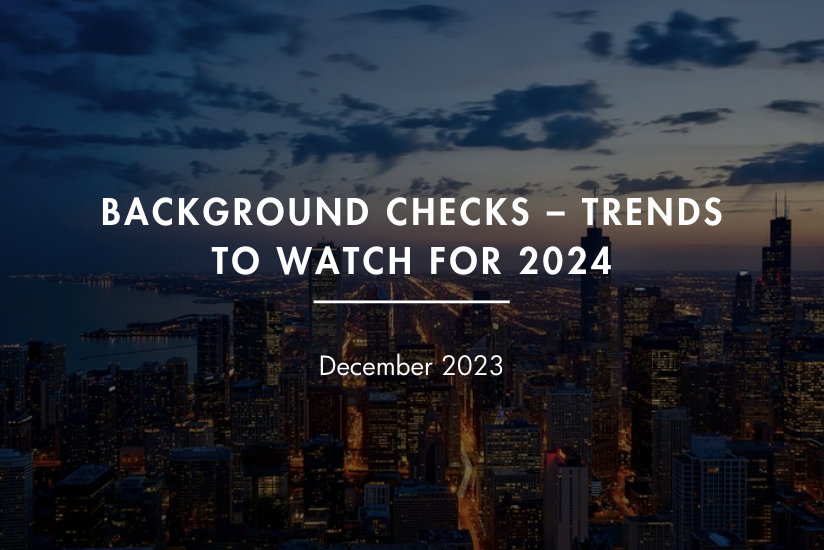As 2023 is coming to a close, there are certain trends in the background screening space that will likely continue to present themselves as challenges and opportunities. Four of the most significant areas are:
- Redaction of dates of birth (DOB) on county criminal records, and the concomitant reality of longer delays with county criminal records searches.
- Continuous Criminal Monitoring becoming more prevalent, as organizations seek to mitigate risk and safeguard their brands.
- The Consumer Financial Protection Bureau’s (CFPB) mission to ensure that tenant screening practices are in compliance with the Fair Credit Reporting Act (FCRA) will be unabated, in order to monitor that the multi-family and apartment industries and consumer reporting agencies are complying with the FCRA.
- Drug screening for cannabis will be more problematic due to evolving state laws.
Redaction of Dates of Birth
As I have written before, government entities are increasingly concerned about protecting consumer privacy. However, in their reasonable attempts to safeguard the personal information of consumers, they are making it extremely difficult for entities with legitimate business purposes AND consumer consent to obtain criminal records.
Consumer reporting agencies (CRA’s) only perform background checks with the authorization of the consumer for some permissible business purpose, i.e., employee screening, tenant screening, volunteer screening, franchisee screening, country club membership screening, student screening, board of director screening, and other types of background checks. As criminal records typically do not have social security numbers (SSN), the complete date of birth is critical to verifying that a criminal record actually belongs to an individual.
By counties redacting dates of birth, the process to try to verify a record before it can be released to an end user – such as an employer or landlord – as required by the FCRA, is taking longer, if it can ever be completed at all. This is a disservice to employers, apartment owners, and the individuals who are applying for jobs and apartments, and other types of positions. Counties need to allow full authorized access for CRAs who already have the permission of the individual being checked. This access should be separate from the justifiably redacted information available to anyone on the worldwide web. For those who need to obtain criminal records, contact your state and county legislators, and demand that CRA’s and other authorized companies be allowed to easily obtain complete DOBs.
Continuous Criminal Monitoring
Performing pre-employment background checks is important, as well as performing them for tenant screening, volunteer screening, member screening and franchisee screening. However, people and situations change. Once an individual is accepted into any type of position, they could in fact be later convicted of a criminal offense. Even serious crimes sometimes result in probation only and/or community service, due to over-crowded prisons.
The brand of an organization and its financial security can be threatened when criminals are associated with them, particularly with viral social media which can spread bad press quickly. The availability now of Continuous Criminal Monitoring will increasingly become a tool to mitigate risk for companies. More and more organizations are implementing Continuous Criminal Monitoring, and this is a trend that is expected to continue to increase.
Tenant Screening Practices
The Consumer Financial Protection Bureau (CFPB) has been actively pursuing companies to ensure that tenant screening reports are being properly constructed and delivered to end user clients (landlords), so that the rights of consumers are being protected under the FCRA. This means that adverse public record information, such as criminal records and eviction records are properly verified from the original source (typically the county clerk’s office), before they are reported to the end user (landlord or apartment).
This is a challenge for the multi-housing industry, as they have typically wanted instant, low-cost reports. While instant reports are still possible when there are no public records, if there are possible criminal or eviction records, these must first be verified from the original county source before they can be reported. The multi-family industry needs to recognize that this is a requirement of the FCRA. Possible public record “hits” are NOT always your applicant. These public records generally have no SSN, so verifying these records is a longer, but required process, which can be delayed further due to county labor and budget cuts, as well as the Redaction of DOB discussed above.
Drug Screening for Cannabis
With the expanding legalization of cannabis, companies who perform drug screening need to be aware of the ever-evolving change in state and local cannabis laws. Most states do not permit employers to discriminate against employees, who use a lawful product on their free time. This is an issue with cannabis being legal now in many states, and thus the need to determine if the use was on-duty or off-duty.
California AB 2188 brings new limitations to almost all employers beginning 01-01-2024. Their findings are that THC is the chemical that impairs, but most commercially available drug screening tests only show non-psychoactive cannabis (NOT the THC). This law does not make drug screening illegal, but since there really is currently no feasible method to screen for THC, obtaining a positive non-psychoactive cannabis result will NOT be allowed to be considered in California starting next year ( the drug screening must be positive for THC). It should be noted that California state law still allows for an alcohol and/or drug free workplace.
In Washington state, SB 5123 also becomes effective 01/01/24. This law makes it unlawful to discriminate for cannabis use in the initial hiring process. Unlike California, this applies only to pre-employment. Post accident testing or testing for suspicion is still allowed.
For companies with multi-state locations and/or employees, it is advisable to seek their own legal counsel for determining how their drug screening and onboarding processes may need to be modified, as cannabis legalization and laws related to its use, continue to be codified.
Posted by: Rudy Troisi, L.P.I., President and CEO, Reliable Background Screening
Copyright © 2023, Reliable Background Screening, a Division of Marcett, Inc. All rights reserved.


